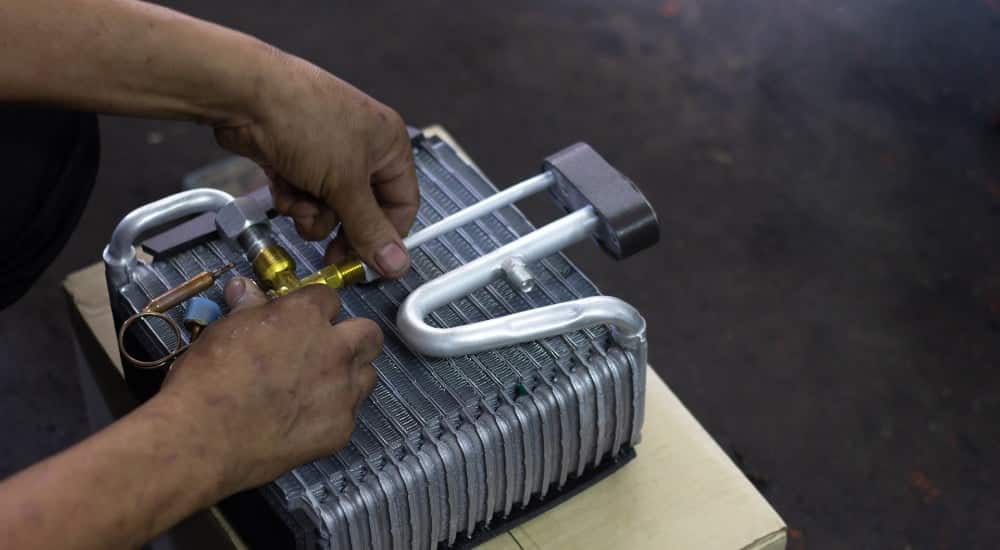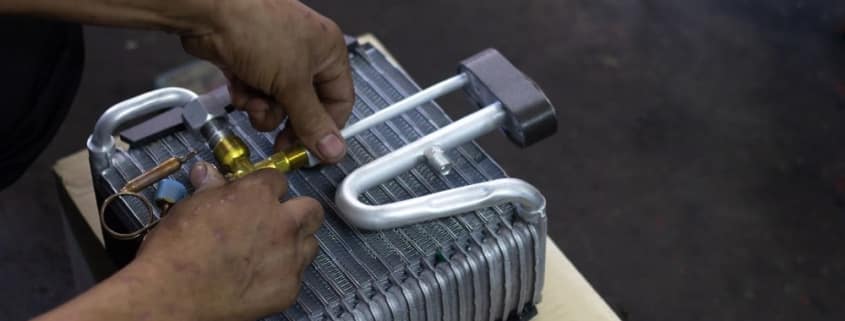As an Amazon Associate, I earn from qualifying purchases at no extra cost to you.
What are the Signs of a Bad Evaporator?
Signs of a bad evaporator include weak airflow or warm air blowing from the vents. Other indicators can be foul odors or unusual noises coming from the evaporator.
A malfunctioning evaporator in your HVAC system can lead to inefficient cooling and increased energy bills. Recognizing the signs of a faulty evaporator early on can help prevent further damage and costly repairs. It is essential to address any issues promptly to ensure optimal performance and comfort in your home or workspace.
We will explore common symptoms of a bad evaporator and provide insights on how to address these issues effectively.

Credit: natrad.com.au
Signs Of A Bad Evaporator
A bad evaporator can cause issues such as weak airflow, warm air blowing from the vents, and unpleasant odors in the vehicle’s interior. It’s important to identify these signs early on to avoid further damage to the AC system.
The evaporator in your HVAC system plays a crucial role in cooling your home. However, when it starts to malfunction, it’s important to be able to recognize the signs of trouble. Weak Cooling Performance, Frequent Ice Buildup, Strange Smells, and Water Leaks are common indicators of a bad evaporator.Weak Cooling PerformanceWhen the evaporator is failing, you may notice that your HVAC system struggles to keep your home at the desired temperature. This can lead to discomfort and higher energy bills. A decrease in cooling effectiveness is a key sign that there's a problem with the evaporator.Frequent Ice BuildupIf you notice ice forming on the evaporator coils, it could be a sign of trouble. Frequent ice buildup signifies that the evaporator is not functioning properly and may require attention from a professional technician.Strange SmellsUnusual odors emanating from your HVAC system can be a red flag for a malfunctioning evaporator. Strange smells, such as musty or moldy odors, could indicate that the evaporator coils are dirty or contaminated. This can impact air quality and should be addressed promptly.Water LeaksAnother common sign of a bad evaporator is water leaks around the indoor unit of your HVAC system. Persistent moisture or puddles around the unit may suggest that the evaporator is not functioning correctly, leading to potential water damage if left unaddressed.Being vigilant for these signs can help you identify and address evaporator issues before they escalate. Regular maintenance and prompt repairs can extend the lifespan of your HVAC system and ensure optimal performance.Causes Of A Bad Evaporator
If your AC is malfunctioning, one of the possible culprits could be a bad evaporator. Understanding the causes of a bad evaporator can help you diagnose and address the issue promptly.
Refrigerant Leak
A refrigerant leak is a common cause of a bad evaporator. When the evaporator coils develop a leak, the refrigerant may escape, leading to insufficient cooling performance.
Dirty Coils
Dirty coils can also contribute to a malfunctioning evaporator. Accumulated dirt and debris on the coils hinder heat transfer, resulting in reduced efficiency and potential damage to the evaporator.
Electric Faults
Electric faults within the evaporator unit can cause operational issues. Faulty electrical components such as sensors or wiring can disrupt the cooling process and indicate a deteriorating evaporator.
Also Read: What are the Symptoms of Bad Valve Springs?
Effects Of A Bad Evaporator
Reduced Energy Efficiency: A bad evaporator can lead to decreased cooling performance.
Possible Damage to Compressor: A faulty evaporator may cause stress on the compressor.
Costly Repairs: Repairing or replacing an evaporator can be expensive.

Credit: m.youtube.com
Tips For Evaporator Maintenance
When it comes to keeping your evaporator in top condition, regular maintenance is key. By following these essential tips for evaporator maintenance, you can ensure your system continues to operate efficiently and effectively.
Regular Cleaning
Regular cleaning of the evaporator coils is crucial for maintaining the optimal performance of your HVAC system. Over time, dirt, dust, and debris can build up on the coils, reducing their ability to absorb heat from the air. This can lead to decreased cooling efficiency and increased energy consumption.
Replacing Air Filters
Replacing air filters is a simple yet vital aspect of evaporator maintenance. Clogged or dirty filters can restrict airflow, causing the system to work harder and potentially leading to mechanical issues. Regularly replacing air filters can improve indoor air quality and extend the lifespan of your HVAC system.
Professional Inspections
Regular professional inspections by qualified HVAC technicians are essential for identifying and addressing potential issues with the evaporator. These inspections can help detect problems early on, preventing costly repairs and ensuring the system operates at peak performance.
When To Seek Professional Help
When it comes to your evaporator, recognizing signs of trouble is crucial. While you may be able to troubleshoot some minor issues on your own, there are certain situations when it’s best to seek professional help. In this section, we will explore three specific signs of a bad evaporator and discuss when it’s necessary to call in the experts.
Lack Of Cooling
If you’ve noticed that your air conditioner is not producing cool air as it should, it may be a sign of a faulty evaporator. The evaporator is responsible for cooling the air as it passes through the system, and any malfunction can disrupt this process. So, if you find yourself sweating indoors even with the AC running, it’s time to take action.
Continuous Ice Formation
Ice formation on your evaporator coils is another indication that something is amiss. While a thin layer of frost is normal, a thick layer or continuous ice formation signals a problem. This can be caused by refrigerant leaks, blocked airflow, or other issues that require professional attention. Ignoring this warning sign can lead to further damage to your system.
Persistent Odors
Foul smells emanating from your air conditioning system are not only unpleasant but also point to a defective evaporator. Mold, mildew, or bacterial growth within the unit can cause these persistent odors. Attempting to tackle the issue yourself may only provide temporary relief, as the root cause needs to be addressed professionally to prevent the problem from recurring.
Dealing with a bad evaporator on your own can be challenging and may even exacerbate the issue. That’s why it’s vital to recognize these signs and seek professional help when necessary. Contacting a qualified HVAC technician will ensure a proper diagnosis and prompt resolution, preventing further damage to your evaporator and ultimately extending the lifespan of your air conditioning system.

Credit: natrad.com.au
Conclusion
The signs of a bad evaporator should not be overlooked. Addressing these issues promptly can prevent further damage to your HVAC system. Whether it’s reduced cooling performance or unusual noises, recognizing the symptoms early can save you from costly repairs.
Stay vigilant and schedule regular maintenance to keep your evaporator in top condition.


